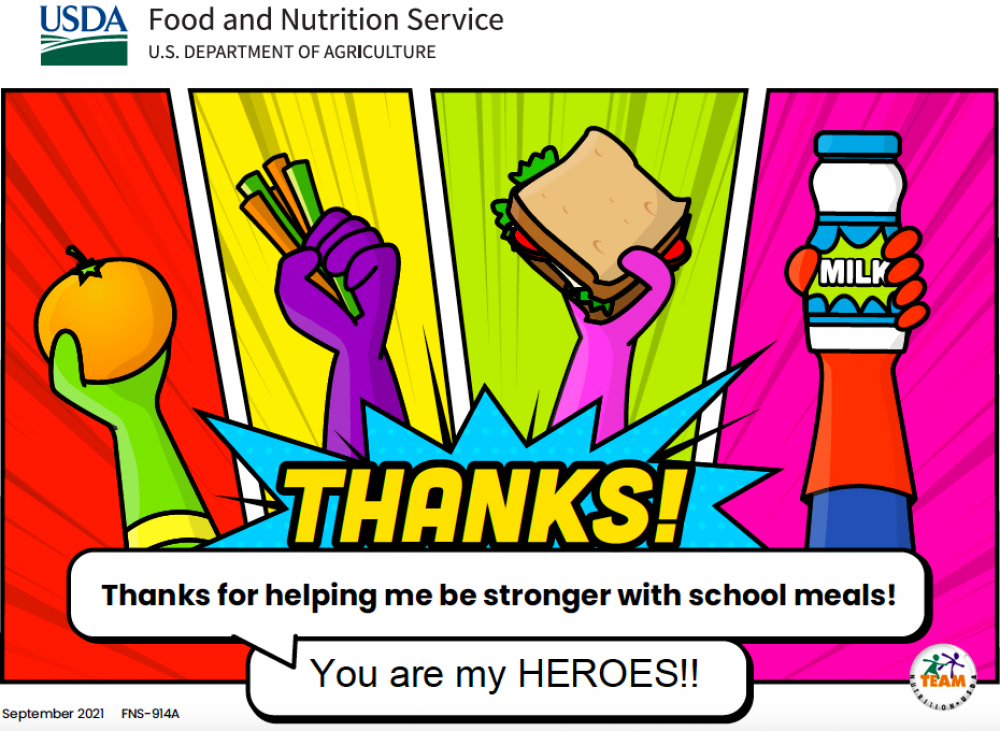By Dayle Hayes, MS, RD
While the buzz about National School Breakfast Week, is now behind us, the reasons to expand morning meals at school sit in America’s classrooms every day. Many children are still coming to school too hungry to focus on their teachers and too hungry to learn. In the 2015 Hunger in Our Schools Report from No Kid Hungry, 3 out of 4 public school teachers say that students regularly come to school hungry and 81% say this happens at least once a week. Educators report that hunger results in an inability to concentrate (88%); lack of energy or motivation (87%); poor academic performance (84%); and tiredness (82%).
Fortunately there are solutions. USDA’s School Breakfast Program, which is growing across the country, is the front line in helping all students be well-nourished and ready to learn. Every year the FRAC School Breakfast Scorecard lists participation rates for every state and the District of Columbia. On the plus side, the 2015 report (data from school year 2013-14) shows steady increases since 2003, with a total of 320,000 more low-income students eating a school breakfast each day compared to the prior year.
Sadly, significant school breakfast gaps still exist for low-income children in many states. This is a serious problem because breakfast improves students’ nutrition, health and their ability to focus and pay attention in class. Hungry children cannot listen to their teachers – because they are listening to their stomachs. The just-released Scientific Report of the 2015 Dietary Guidelines Advisory Committee reinforces the importance of breakfast for young people noting that “[B]reakfast eating is associated with more favorable nutrient intakes compared to nutrient intakes from other meals or snacks. Adolescents and young adults are the least likely to eat breakfast, and targeted promotion efforts are needed to reach these groups. For children and adolescents, the school breakfast program is an important venue for promoting breakfast consumption and efforts are needed to increase student participation rates.”

Montana Food Bank Network Supports School Breakfast. More at http://mfbn.org/learn/outreach-education/school-breakfast-program/breakfast-every-student-every-day-psas
As a mom and a child nutrition expert, my mantra is simple. Breakfast. Every Child. Every Day. Research clearly shows that breakfast helps everyone be ready to succeed – and you probably make certain that your family enjoys these benefits every morning. I believe we all must go beyond our own families and support breakfast in every school – even if our kids eat at home. Here’s what you can do to help:
- Digest the facts about breakfast and hungry children in America. The 2015 Hunger in Our Schools Report is a great place to start. You can also Map the Meal Gap in your state or county. A January 2015 Southern Education Foundation research bulletin showed that, for the first time ever, more than half of American children live in poverty. In my opinion, it is a moral imperative that we change this fact. Even if you do not agree, think of all the educational problems that hunger causes in classrooms – including those where your children and grandchildren are trying to learn.
- Explore expert views on the power of school breakfast. Many forward-thinking educational groups understand the research connecting breakfast to academic performance, which is why they are working hard to expand breakfast opportunities at school. Partners for Breakfast in the Classroom – FRAC, the National Association of Elementary School Principals (NAESP) Foundation, the National Education Association Health Information Network (NEA HIN), and the School Nutrition Foundation (SNF) – have a passion for child nutrition and improving educational outcomes, which why they provide a virtual ton of toolkits and resources for making breakfast work in any K-12 school.
- Advocate for breakfast in your community. Students from every income level benefit from a balanced morning meal every day, whether they eat it at home or school. Fuel Up to Play 60, a national program to improve school nutrition and fitness, has made healthy breakfast choices and effective school breakfast programs a priority. Check with your local dairy council about how to #FuelGreatness at breakfast and learn about fun ways to get all students more excited about that “most important meal of the day.”
While your child may be able to opt out of a school breakfast program, their friends and classmates may not have that luxury for a myriad of reasons. Breakfast is a simple, cost-effective way for high-performing schools to help every child be well nourished and ready to learn. That’s a strategy that I support as a mom, a Registered Dietitian (RD) and a taxpayer.

Maple Apple French Toast, Windham-Raymond RSU #14, Maine. Recipe from Vermont FEED, New School Cuisine Cookbook (http://www.vtfeed.org/materials/new-school-cuisine-cookbook)
This blog post originally appeared on the Midwest Dairy Makes Sense blog as School Breakfast Makes the Grade.


Reblogged this on Nutrition Services.
Pingback: Best of National School Breakfast Week 2015: Our ‘Final Four’ Top Picks!
Wow, half of American children live in poverty? And I thought the 20% here in Germany are evidence of incapacity. But poverty is only part of the reason why so many children come hungry to school. It also depends on their individual upbringing and the attitude of society in general. I have taught classes in Thailand, where people are poor way beyond our means, and I can’t remember having seen hungry kids. On the contrary, they would bring tons of food into the classroom. Eating is a social thing there. Kids would have a decent breakfast with their parents at home and then share a second one with their classmates. It’s a shift of priorities: “the west” focuses on punctuality & profitability (both don’t allow for a good breakfast with your family) whereas other countries focus on family and happiness. I think the problem really is that profound.
Pingback: How one small change got more students eating breakfast regularly. – How To Drive Huge Targeted Traffic To Any Website